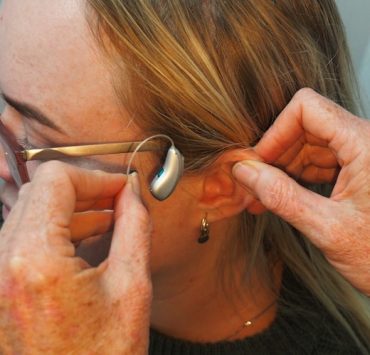Mastering ‘health’ talk

May Parsons, the Filipino nurse who administered the world’s first vaccine against COVID-19 outside of a clinical trial in the United Kingdom, knows the importance of precise language in her profession.
Great language skills in her line of work, Parsons realized, could boost a nurse’s confidence in communicating with patients and colleagues. In fact, one of the first things she had to learn was to communicate in British English. The Philippines, after 50 years under the United States, uses American English.
“In the UK, people use different words and accents, and have different ways of saying things. This taught me the importance of being adaptable and having a strong foundation in English, which is so important for effective communication at work,” the Filipino nurse notes.
Parsons has become an ambassador for OET (Occupational English Test), a global leader in English language testing for health-care professionals.
Sujata Stead, chief executive officer of OET, explains why more specialized language skills are needed by health-care professionals.
“The essence of health-care communication goes beyond general English language proficiency. Health professionals operate in a highly specialized environment where precise language, specific terminologies and the ability to navigate sensitive conversations are paramount. The OET is designed specifically to assess these critical linguistic and communication skills within a health-care context,” Stead says.
General English tests, she points out, provide a broad assessment of English language skills. OET, on the other hand, focuses on the ability to comprehend and use English effectively in medical scenarios. “This ensures that health professionals are not only proficient in English but are also prepared to deliver safe, effective, and empathetic care to patients in English-speaking health-care settings.”
Profession-specific
OET ensures that globally mobile health-care professionals possess profession-specific language skills.
Health-care professionals are given access to the tools and support necessary to succeed in OET. They are provided a “wealth of preparation resources, including practice materials, sample tests and official preparation guides,” and the help of preparation partners.
Research indicates, Stead says, that effective communication in health care is paramount for patient safety and the delivery of quality care to vulnerable individuals in need. OET facilitates this connection “in a sustainable and ethical manner, considering the interests of both sending and receiving countries.”
The approach is personalized to ensure effective preparation, the amount of time needed to attain the required language skills dependent on a candidate’s current proficiency.
“We offer a product called OET Pulse, a diagnostic test that swiftly assesses your current English level,” Stead says. OET has a global network of premium preparation providers, including language schools, to help in test preparation.
PH a ‘pivotal’ market
Stead stresses, “The Philippines holds a pivotal position in our organization’s focus, given its production of the world’s most sought-after nurses … [It] is of utmost importance as one of our key countries where candidates pursue OET.”
She says OET aims to collaborate with educational institutions and hospitals in the Philippines to enhance nurses’ language skills. The collaboration also aims to ensure that the benefits are not exclusively directed to the overseas country, but also contribute to the Philippines. OET-trained nurses, equipped with exceptional communication skills, can provide safe and quality care while working in the Philippines before considering opportunities abroad.
While they are helping secure job placements for those wanting to work abroad, Stead says OET is “committed to ethical recruitment practices that benefit both sending and receiving countries. Our aim is not just to improve the lives of individuals but also to contribute to the communities involved in their journey toward a better life.”
OET is collaborating with the Philippine Nursing Association, focusing on championing the global competence, welfare and positive professional image of Filipino nurses.
It has also partnered with Dr. Carl Balita group, which boasts of the largest network of review centers across the Philippines. OET, Stead says, is designing a customized course focusing on reading skills, as published reports suggest that this is an area where Filipino performance needs improvement.
Just how career-specific OET is, for Stead, is demonstrated by the story of Engie, a Filipino nurse who had taken the general English test when applying for a job in the UK.
Engie failed in her initial attempt to work in the UK. Discovering OET’s relevance to her nursing career, she took the specialized program and test. She is now a community nurse in the UK.
Stead points out, “OET focuses on communication with patients, addressing their anxieties, delivering difficult news, and translating technical language into understandable terms.”
OET, according to Stead, will be launching its career portal, a platform featuring a large pool of English-ready, globally mobile health-care professionals who have successfully taken the test. Through the portal, OET will facilitate connections in a safe manner, introducing professionals to recruitment agencies and hospitals seeking English-trained health-care staff.
“Our primary focus is on promoting effective language learning and thorough test preparation,” she says.
Parsons supports every OET initiative to enhance the communication skills of Filipino nurses. “I want other nurses to know that they will be well-equipped to deliver high-quality care by taking OET, because the OET test is designed for the health-care workplace.” —CONTRIBUTED INQ

















